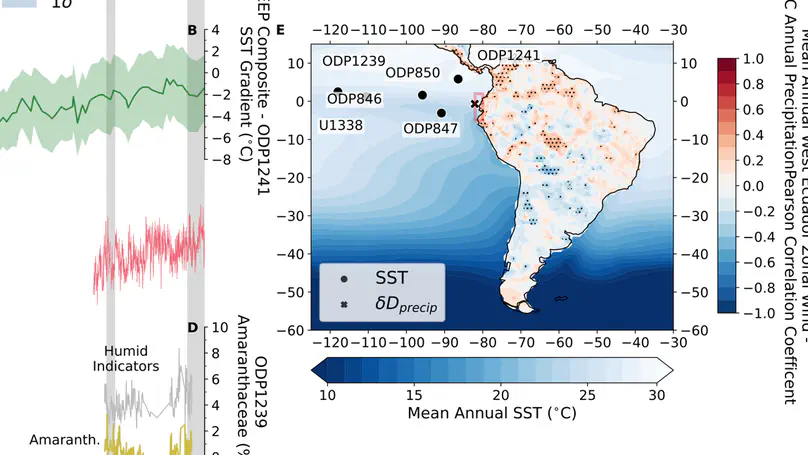David Fastovich
Postdoctoral Scholar in Paleoclimate Dynamics
Syracuse University Paleoclimate Dynamics Lab
Hi, I’m David!
I’m currently a postdoctoral researcher at Syracuse University in Tripti Bhattacharya’s Paleoclimate Dynamics Lab where I am using leaf wax biomarkers and isotope-enabled climate simulations to reconstruct tropical circulation from Earth’s recent past. My recent interests are broad but deeply rooted in using the geologic record of past climatological and ecological changes to better understand future global change. In the past, I have used microbial biomarkers, fossil-pollen abundances, leaf-wax biomarkers, and climate simulations to understand the patterns, causes, and legacies of past climate changes.
- Paleoclimate proxy reconstructions
- Paloeclimate modeling
- Fossil-pollen vegetation reconstructions
- Paleoecological dynamics
-
PhD in Geography, 2022
University of Wisconsin - Madison
-
MS in Geography, 2018
University of Wisconsin - Madison
-
BS in Environmental Science and Management, 2016
University of California, Davis
Featured Publications
See all of my publications here.
Courses
GEOG206: The Global Environment
The Earth is in ceaseless motion with interactions between the atmosphere, biosphere, lithosphere, and hydrosphere that setting the stage for the world around us. The Global Environment introduces students to these spheres and their interconnectedness which makes Earth a livable planet. This course is developed for a broad audience, irrespective of background, and aims to give students the tools necessary to understand their physical environment. The lab component of the course gives students hands on experience with authentic and simulated data and emphasizes hypothesis testing throughout each assignment.
Past and Future Climate Change
Syllabus in development
Earth’s climate is constantly changing - ice sheets once covered much of the Northern Hemisphere 21,000 years ago and crocodiles onced lived near the South Pole ~250 million years ago. Yet, human-caused climate change is occurring faster than any climate change experienced within the last 50 million years. This class looks into Earth’s past to understand how climate evolves and how biological systems have responded to past climate changes. This perspective is used to contextualize contemporary climate change and provide students with the tools necessary to understand projected climate change. The lab component of this course provides students with hands-on experience with various types of proxy climate data which culminates in comparisons against student-run paleoclimate simulations from EzGCM.
Skills
tidyverse, rioja, sf, sp, terra, neotoma2, RMarkdown
xarray, metpy, SciPy, pandas, NumPy, matplotlib, Jupyter Notebook, keras, PyTorch, TensorFlow, PyNGL
HTCondor, Singularity/Apptainer, Docker
ArcGIS, GDAL, OGR
Laboratory and identification methodology



